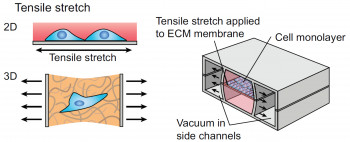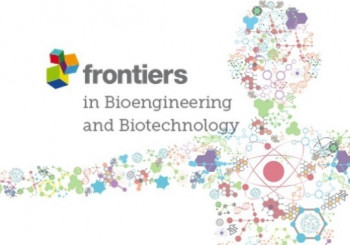News
Knight's group publish new paper on the importance of mechanical stimulation in organ-chip technology
24 February 2021


Prof Knight and colleagues at Queen Mary University of London and University College Dublin have published a new paper discussing the importance of incorporating mechanical stimulation into organ-on-a-chip technology. Prof Knight will be discussing this work at the forthcoming Pan-London 3Rs Symposium.
Organ-chip models consist of living cells grown in specialised microfluidic 'chips' in the laboratory such that the cells are provided with all the stimuli required to replicate key aspects of cell, tissue and organ behaviour, as seen in the body. This enables these bioengineering devices to be used to understand fundamental aspects of human biology and predict the safety and efficacy of new pharamceutical treatments. As such organ-chips are increasingly seen as an alternative to simplistic 2D cell culture systems and non-human animal tests.
The new review paper explains how cells within our bodies are routinely exposed to a variety of complex, time dependent mechanical stimuli and how these regulate aspects of cell behaviour including the response to therapeutic drugs. Therefore the authors suggest that it is essential that organ-chips models incorporate appropriate biomechanical stimuli in order more accurately predict biological responses in human.
The paper described the various commercial organ-chip systems that are available and the types of mechanical stimulation that they provide. Currently there are very few systems that incorporate appropriate mechanical stimulation beyond the application of fluid shear forces from culture media flowing over cells. One of the few platforms that does provide mechanical strain, is the Human Emulation system developed by the organ-chip company, Emulate Inc. Consequently Queen Mary University of London has teamed up with Emulate to open the Queen Mary+Emulate Organs-on-chips Centre which provides open access to this powerful platform technology.
The new paper is published in the journal Frontiers in Bioengineering and Biotechnology and entitled: "Mechanical Stimulation: A Crucial Element of Organ-on-Chip Models." https://www.frontiersin.org/articles/10.3389/fbioe.2020.602646/full
Researchers wanting to utilize the Queen Mary+Emulate Organs-on-chips Centre should visit the website and contact the Centre Scientist, Dr Clare Thompson: https://www.cpm.qmul.ac.uk/emulate/
| Contact: | Martin Knight |
| Email: | m.m.knight@qmul.ac.uk |
| Website: | |
| People: | Martin KNIGHT |
| Research Centre: | Bioengineering |
Updated by: Martin Knight




